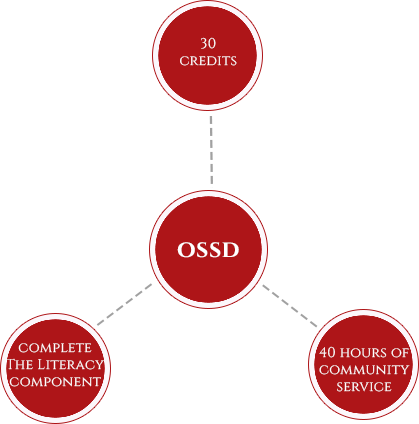 1855 Notre Dame Dr., St. Agatha, ON Canada N0B 2L0
1855 Notre Dame Dr., St. Agatha, ON Canada N0B 2L0 +1 519-954-5955
+1 519-954-5955 info@cicwaterloo.ca
info@cicwaterloo.ca
The achievement of the Ontario Secondary School Diploma (OSSD) is what our students are aiming for. The OSSD and the student’s final transcript is what will allow them to gain admission to universities and colleges worldwide. In order to achieve the Ontario Secondary School Diploma, students must successfully complete a total of 30 credits (18 of which are compulsory and 12 that are electives), the Ontario Literacy Test and 40 hours of community service. A credit is passing (50% and above) a 110-hour course.

The elective courses will be selected from Canadian Independent College’s course offerings based on the Ontario Ministry of Education curriculum.

The Ontario Secondary School Literacy Test (OSSLT) is the usual method for assessing the literacy skills of students in Ontario for the purpose of determining whether they meet the provincial secondary school literacy requirement for graduation. The test thus identifies students who have demonstrated the required skills in literacy; as well as those who have not demonstrated the required skills and will need to do further work. The test identifies the specific areas in which these latter students need remediation. The test is scheduled by and administered through the Education Quality and Accountability Office (EQAO) once each year, usually in the spring. Please click on the links to view practice for the OSSLT.
Click Here to download a form that you must used to track your hours.
As stated in Ontario Secondary Schools, Grades 9 to 12: Program and Diploma Requirements, every student must complete a minimum of 40 hours of community involvement activities as part of the requirements for an Ontario Secondary School Diploma (OSSD). Effective July 1, 2011, students are able to start accumulating community involvement hours in the summer before they enter grade 9.
The purpose of the community involvement requirement is to encourage students to develop awareness and understanding of civic responsibility and of the role they can play and the contributions they can make in supporting and strengthening their communities.The work to fulfill this requirement can begin at any time after a student enters grade nine. These activities must be completed outside scheduled class time; they must not be part of a credit course; they must be unpaid activities; they must total a minimum of forty hours; and they must be completed by the end of grade twelve.
The Ministry of Education has developed a list of activities that may not be chosen as community involvement activities and that are therefore ineligible activities. An ineligible activity is an activity that:
In addition to those that the Ministry of Education has listed the following are ineligible:
The following guiding principles, read in conjunction with the list of the ineligible activities, are intended to assist the student and parents/guardians to determine whether a planned activity is within an approved area for the completion of the community involvement requirement:
Where an event or activity does not clearly fall within the guidelines, the Principal of the student’s school has the discretion to approve or reject any activity or event that does not conform to the guiding principles and ethical standards for approved areas of involvement for students.
includes canvassing, walk-a-thons, celebrity games, gift wrapping, gala events and sales for charitable purposes;
includes coaching, helping to organize winter carnivals, parades and summer fairs;
includes helping to organize special meets and games, and volunteering as a leisure buddy or pool assistant;
includes canvassing, walk-a-thons, celebrity games, gift wrapping, gala events and sales for charitable purposes;
includes coaching, helping to organize winter carnivals, parades and summer fairs;
includes helping to organize special meets and games, and volunteering as a leisure buddy or pool assistant;


Copyright 2024 Canadian Independent College | All Rights Reserved